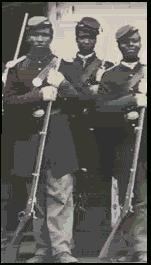Elaboration
If, after scrutiny, evidence is so meager, there must be an additional reason why a large number of academics and non-scholars nonetheless believe that there was a significant body of black soldiers fighting for the South.
 It is, partly, because the scholars who propose such
amounts of black soldiers are misinterpreting the available
sources.(30) Whereas professional historians specialized in
Civil War history discard the possibility that large
numbers of blacks served in Southern ranks, the academics
most actively promulgating black Confederates are not, in
fact, trained historians. The risk is great, therefore,
that they lack the scrutiny needed to make a correct
interpretation and take sources on face value.
It is, partly, because the scholars who propose such
amounts of black soldiers are misinterpreting the available
sources.(30) Whereas professional historians specialized in
Civil War history discard the possibility that large
numbers of blacks served in Southern ranks, the academics
most actively promulgating black Confederates are not, in
fact, trained historians. The risk is great, therefore,
that they lack the scrutiny needed to make a correct
interpretation and take sources on face value.
The sources used by them are, after all, largely unreliable, as is explained by Bruce Chadwick, in The Reel Civil War. In the post-bellum, pre-film era (roughly 1865 to 1920) a historiographical trend of revisionism and reconciliation flourished.(31) This trend was characterized by an emphasis on the personal endurance of horrors in the war by both North and South, and, to serve reconcilation, any blame the South had in provoking the conflict was largely ignored or smoothed over, thus opening the way to a glorification of the antebellum South. Consequently, Southerners should never been seen again as evil slave owners.(32) It was during this period also, that the pro-Confederate publications, such as the Confederate Veteran were started; the stories in which, combined with anniversaries and reunions, added to nostalgia, feeding the growing belief "that at least the Southern boys were just as brave and heroic as the Northern boys."(33)
If that period was mainly concerned with "accomplish[ing] the essential task of solidifying a united nation,"(34) since the 1950s, a growing racial awareness has shifted Civil War history writing, which consquently contended that slavery was an important cause of the Civil War.(35) When the end of the twentieth century gave rise to a new branch of Civil War historiography, those historians had to include this racial awareness in their search for what David W. Blight, professor of history at Yale University, dubs: a "national narrative for what the war was about."(36) If slavery did not fit well into this "new nationalism" of the end of the twentieth century in which the South was pardoned by mere devotion (i.e, "devotion alone made everyone right and no one truly wrong"),(37) the solution would be to get rid of slavery as a grave wrong and cause of the war.
This appears to be exactly what the academics have done to support the idea of a significant number of black soldiers: they use the sources of the first historiographic, reconciliatory period, the idea of a shared devotion, which not only justified the South, but also solidified the nation. Segar and Barrow, for example, sift out "important passages" from books written between 1865 and 1925, and use The Confederate Veteran as an "invaluable source."(38) The important difference is, however, that the area of focus is the one mainly left out in the earlier period; thus combining the reconciliation of the "new nationalism" with the racial awareness of preceding era. Hence, the implication seems to be the extra motivation beyond mere truth value.
